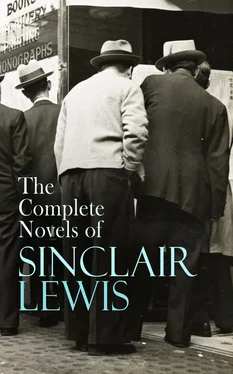Sinclair Lewis
The Complete Novels of Sinclair Lewis
Main Street, Babbitt, It Can't Happen Here, Arrowsmith, Elmer Gantry, Dodsworth, Free Air, Mantrap…
e-artnow, 2022
Contact: info@e-artnow.org
EAN 4066338119957
Table of Contents
Babbitt
Free Air
Main Street
The Trail of the Hawk
The Innocents
The Job
Our Mr. Wrenn
Arrowsmith
Mantrap
Elmer Gantry
The Man Who Knew Coolidge
Dodsworth
Ann Vickers
Work of Art
It Can't Happen Here
The Prodigal Parents
Bethel Merriday
Gideon Planish
Cass Timberlane
Kingsblood Royal
World So Wide
Table of Contents
Chapter I
Chapter II
Chapter III
Chapter IV
Chapter V
Chapter VI
Chapter VII
Chapter VIII
Chapter IX
Chapter X
Chapter XI
Chapter XII
Chapter XIII
Chapter XIV
Chapter XV
Chapter XVI
Chapter XVII
Chapter XVIII
Chapter XIX
Chapter XX
Chapter XXI
Chapter XXII
Chapter XXIII
Chapter XXIV
Chapter XXV
Chapter XXVI
Chapter XXVII
Chapter XXVIII
Chapter XXIX
Chapter XXX
Chapter XXXI
Chapter XXXII
Chapter XXXIII
Chapter XXXIV
Table of Contents
I
The towers of Zenith aspired above the morning mist; austere towers of steel and cement and limestone, sturdy as cliffs and delicate as silver rods. They were neither citadels nor churches, but frankly and beautifully office-buildings.
The mist took pity on the fretted structures of earlier generations: the Post Office with its shingle-tortured mansard, the red brick minarets of hulking old houses, factories with stingy and sooted windows, wooden tenements colored like mud. The city was full of such grotesqueries, but the clean towers were thrusting them from the business center, and on the farther hills were shining new houses, homes — they seemed — for laughter and tranquillity.
Over a concrete bridge fled a limousine of long sleek hood and noiseless engine. These people in evening clothes were returning from an all-night rehearsal of a Little Theater play, an artistic adventure considerably illuminated by champagne. Below the bridge curved a railroad, a maze of green and crimson lights. The New York Flyer boomed past, and twenty lines of polished steel leaped into the glare.
In one of the skyscrapers the wires of the Associated Press were closing down. The telegraph operators wearily raised their celluloid eye-shades after a night of talking with Paris and Peking. Through the building crawled the scrubwomen, yawning, their old shoes slapping. The dawn mist spun away. Cues of men with lunch-boxes clumped toward the immensity of new factories, sheets of glass and hollow tile, glittering shops where five thousand men worked beneath one roof, pouring out the honest wares that would be sold up the Euphrates and across the veldt. The whistles rolled out in greeting a chorus cheerful as the April dawn; the song of labor in a city built — it seemed — for giants.
II
There was nothing of the giant in the aspect of the man who was beginning to awaken on the sleeping-porch of a Dutch Colonial house in that residential district of Zenith known as Floral Heights.
His name was George F. Babbitt. He was forty-six years old now, in April, 1920, and he made nothing in particular, neither butter nor shoes nor poetry, but he was nimble in the calling of selling houses for more than people could afford to pay.
His large head was pink, his brown hair thin and dry. His face was babyish in slumber, despite his wrinkles and the red spectacle-dents on the slopes of his nose. He was not fat but he was exceedingly well fed; his cheeks were pads, and the unroughened hand which lay helpless upon the khaki-colored blanket was slightly puffy. He seemed prosperous, extremely married and unromantic; and altogether unromantic appeared this sleeping-porch, which looked on one sizable elm, two respectable grass-plots, a cement driveway, and a corrugated iron garage. Yet Babbitt was again dreaming of the fairy child, a dream more romantic than scarlet pagodas by a silver sea.
For years the fairy child had come to him. Where others saw but Georgie Babbitt, she discerned gallant youth. She waited for him, in the darkness beyond mysterious groves. When at last he could slip away from the crowded house he darted to her. His wife, his clamoring friends, sought to follow, but he escaped, the girl fleet beside him, and they crouched together on a shadowy hillside. She was so slim, so white, so eager! She cried that he was gay and valiant, that she would wait for him, that they would sail —
Rumble and bang of the milk-truck.
Babbitt moaned; turned over; struggled back toward his dream. He could see only her face now, beyond misty waters. The furnace-man slammed the basement door. A dog barked in the next yard. As Babbitt sank blissfully into a dim warm tide, the paper-carrier went by whistling, and the rolled-up Advocate thumped the front door. Babbitt roused, his stomach constricted with alarm. As he relaxed, he was pierced by the familiar and irritating rattle of some one cranking a Ford: snap-ah-ah, snap-ah-ah, snap-ah-ah. Himself a pious motorist, Babbitt cranked with the unseen driver, with him waited through taut hours for the roar of the starting engine, with him agonized as the roar ceased and again began the infernal patient snap-ah-ah — a round, flat sound, a shivering cold-morning sound, a sound infuriating and inescapable. Not till the rising voice of the motor told him that the Ford was moving was he released from the panting tension. He glanced once at his favorite tree, elm twigs against the gold patina of sky, and fumbled for sleep as for a drug. He who had been a boy very credulous of life was no longer greatly interested in the possible and improbable adventures of each new day.
He escaped from reality till the alarm-clock rang, at seven-twenty.
III
It was the best of nationally advertised and quantitatively produced alarm-clocks, with all modern attachments, including cathedral chime, intermittent alarm, and a phosphorescent dial. Babbitt was proud of being awakened by such a rich device. Socially it was almost as creditable as buying expensive cord tires.
He sulkily admitted now that there was no more escape, but he lay and detested the grind of the real-estate business, and disliked his family, and disliked himself for disliking them. The evening before, he had played poker at Vergil Gunch's till midnight, and after such holidays he was irritable before breakfast. It may have been the tremendous home-brewed beer of the prohibition-era and the cigars to which that beer enticed him; it may have been resentment of return from this fine, bold man-world to a restricted region of wives and stenographers, and of suggestions not to smoke so much.
From the bedroom beside the sleeping-porch, his wife's detestably cheerful “Time to get up, Georgie boy,” and the itchy sound, the brisk and scratchy sound, of combing hairs out of a stiff brush.
He grunted; he dragged his thick legs, in faded baby-blue pajamas, from under the khaki blanket; he sat on the edge of the cot, running his fingers through his wild hair, while his plump feet mechanically felt for his slippers. He looked regretfully at the blanket — forever a suggestion to him of freedom and heroism. He had bought it for a camping trip which had never come off. It symbolized gorgeous loafing, gorgeous cursing, virile flannel shirts.
He creaked to his feet, groaning at the waves of pain which passed behind his eyeballs. Though he waited for their scorching recurrence, he looked blurrily out at the yard. It delighted him, as always; it was the neat yard of a successful business man of Zenith, that is, it was perfection, and made him also perfect. He regarded the corrugated iron garage. For the three-hundred-and-sixty-fifth time in a year he reflected, “No class to that tin shack. Have to build me a frame garage. But by golly it's the only thing on the place that isn't up-to-date!” While he stared he thought of a community garage for his acreage development, Glen Oriole. He stopped puffing and jiggling. His arms were akimbo. His petulant, sleep-swollen face was set in harder lines. He suddenly seemed capable, an official, a man to contrive, to direct, to get things done.
Читать дальше












